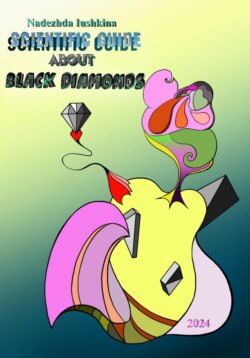Читать книгу Scientific guide about black diamonds - - Страница 1
Introduction
ОглавлениеDiamonds are known for their high hardness combined with visual and aesthetic characteristics. The hardness of a diamond is determined by its crystalline structure, in which each carbon atom is bonded to other carbon atoms. This makes diamond an incredibly strong and hard material, allowing it to be used in various fields, including jewelry, industrial applications, and new technologies.
Black diamonds come in different shades: besides jet black, they can be shades of dark cognac, graphite, or asphalt colors.
The emergence of black diamonds is caused by several reasons: partial changes in the crystalline structure, in opaque black diamonds there is a high content of micro particles of graphite and amorphous carbon, invisible even under high magnification, in transparent black diamonds – a higher concentration of nitrogen ions. The bluish-black tint is given by a specific mineral – magnetite, which also has magnetic properties.
Research into the cause of color in black diamonds is relatively recent. Today we know that most naturally colored black diamonds get their color from large quantities or clouds of minute mineral inclusions such as graphite, pyrite or hematite that extend throughout the stone.
Black diamonds reflect light only through their facets. Many black diamonds have a distinct sparkle.
Another characteristic of some varieties of black diamonds is their matte opacity, which is just as mesmerizing as the sparkle and shine of the facets of other diamonds.
Black diamonds, with their captivating allure and mysterious origins, have been sought after by miners and gem enthusiasts for centuries. The history of black diamond mining spans various regions of the world, each with its own tale of discovery, challenges, and triumphs.
One of the most renowned regions for black diamond mining is Brazil, where these enigmatic gems were first discovered in the early 18th century. The vast alluvial deposits of the Bahia and Minas Gerais regions yielded an abundance of black diamonds, attracting prospectors from far and wide. However, the rugged terrain and dense vegetation posed significant challenges to miners, requiring perseverance and ingenuity to extract the precious stones from the earth.
In Africa, the Central African Republic emerged as a prominent hub for black diamond mining, particularly in the famous deposits of the diamond-rich regions. Here, miners navigate through dense forests and navigate treacherous rivers to reach the diamond-bearing gravels, where black diamonds are often found alongside other gemstones and minerals. Despite the remote and challenging conditions, the allure of striking it rich lures miners to these untamed landscapes in search of black diamond treasures.
In addition to Brazil and Africa, black diamonds have also been unearthed in other parts of the world, including USA and Russia. In Australia, the Ellendale Diamond Mine gained recognition for its production of high-quality black diamonds, adding to the global supply of these rare gems.
Despite the allure of black diamonds, mining them presents a myriad of challenges for miners. The remote locations of many black diamond deposits require extensive logistical planning and infrastructure development to access, often involving long journeys through rugged terrain and harsh climates. Furthermore, the geological complexity of black diamond formations poses technical challenges during extraction, necessitating specialized equipment and expertise to recover the gems safely and efficiently.
Moreover, environmental and social considerations play a crucial role in black diamond mining operations, with efforts to minimize ecological impact and ensure the well-being of local communities. Sustainable mining practices and community engagement initiatives are increasingly being prioritized to mitigate the negative effects of mining activities and promote responsible resource management.
Next, you will learn more about each type of black diamonds, their origin, composition, structure, human applications, and in the following chapter, you will be able to read about the largest natural specimens of black diamonds ever found and cut into beautiful jewelry settings. You will find it interesting to read about their history and unique characteristics.
